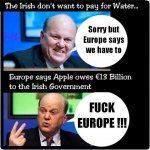blutoski
Penultimate Amazing
- Joined
- Jan 10, 2006
- Messages
- 12,454
For one thing, he didn't really say how much, so it could just be a trivial amount. The purpose would be to send a signal to other foreign governments who might get ideas about retroactive taxation as a valid way to loot these funds.
Secondly: I think they're joining some other internationals' conclusion that there won't be another repatriation tax holiday, so might as well take the hit now and spend the money where it contribute to growing the business. The money invested overseas is only a competitive ROI because of the tax deferral offsetting opportunity costs. It's operationally rational, but may not be strategically justifiable with Google and Amazon aggressively competing in their core market.

